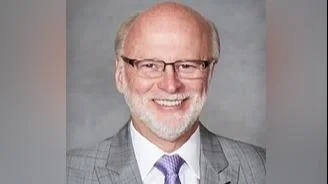Bill Hauter | https://rephauter.com/
Bill Hauter | https://rephauter.com/
Bill Hauter, House Rep. of Illinois House of Representatives, Illinois General Assembly, expressed his opposition to state-mandated nursing ratios during a House committee hearing on Oct 3rd. Hauter, who has been a physician for 26 years and actively involved in solving the nursing crisis, emphasized the need for appropriate and flexible staffing to address the nursing shortage in Illinois.
During the committee hearing held by the House Labor & Commerce, Health Care Licenses committee, Hauter voiced his disagreement with the solution of state-mandated nursing ratios, stating, "We need appropriate staffing. We need flexible staffing. We need acuity matching." He urged members of the committee to consider alternative solutions rather than mandating specific nurse-to-patient ratios.
Hauter's perspective on the nursing shortage in Illinois contradicted a statement made by one of the participants during the hearing. He expressed his surprise at the claim that there was no nursing shortage in the state and asserted that all participants acknowledged the problem of insufficient staffing. Hauter highlighted the importance of reaching a consensus on the problem while advocating for different approaches to addressing it.
In addition to his role as a House Representative, Hauter serves on several committees, including the Health Care Availability & Access Committee, Health Care Licenses Committee, Insurance Committee, Mental Health & Addiction Committee, Prescription Drug Affordability Committee, and the Public Health Committee. He was elected in January 2023 and represents the 87th district.
The committee hearing also featured testimony from various healthcare workers, including unions, nursing homes, hospitals, and other facilities. Lawmakers held the four-hour-long hearing to gather insights and opinions on the changes needed within the industry.
Denise Stiger, the union organizer for Teamsters Local 743, shed light on the challenging working conditions faced by nursing home workers. Stiger highlighted the heavy workload, stating, "Some of these nursing home workers have 20 patients. On the third shift, it might be one CNA to one floor. So, that means she is doing the whole floor. Even though they're saying that the patients are asleep at night, they still have to be changed. They still have to be cleaned."
As discussions continue regarding the nursing shortage in Illinois, the perspectives shared during the committee hearing will play a crucial role in shaping future policies and solutions to address the staffing challenges faced by healthcare facilities in the state.






 Alerts Sign-up
Alerts Sign-up